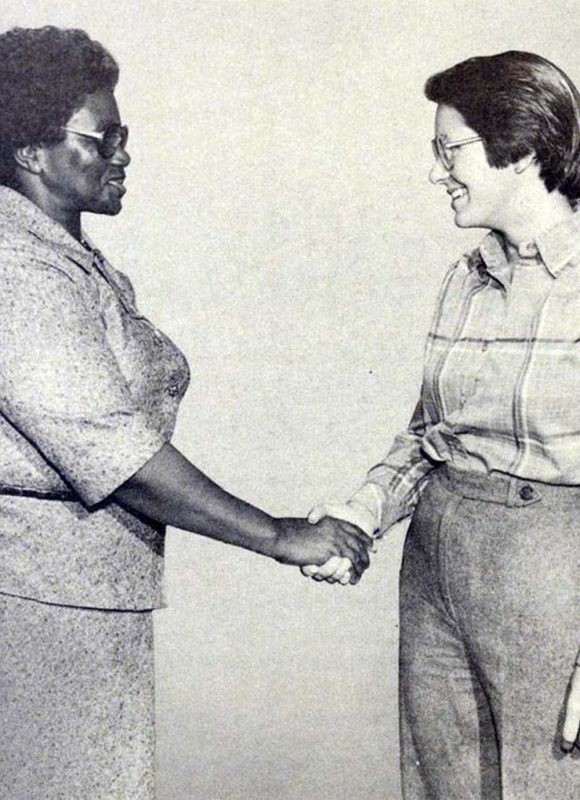PIONEER
Lucy Mvubelo

Anti-apartheid activist | Unionist | Women’s Rights Activist
Born: 20 January 1920 Died: 30 October 2000
“One of my greatest longings, though, is for the day when I can cast my vote and help choose the representative who will do the best job for me in Parliament.”
Who is
Lucy Mvubelo?
Trade unionist in the clothing industry, and the first black woman to be elected to the National Executive Council (NEC) of the Trade Union Council of South Africa (TUCSA).
Professions
and Roles
Trade unionist, anti-apartheid activist.
Best Known For
Crucial contribution to the development of South African trade unions.
Life highlights
- At the age of 18 Mvubelo began teaching, but left the profession in 1942 because of low salaries. She then joined the clothing industry.
- Mvubelo’s father had belonged to the Industrial and Commercial Workers’ Union (ICU). She soon became involved with the Garment Workers Union in 1946 and was one of the first black women to be elected to the NEC of TUCSA.
- Mvubelo also took an active part in the Defiance Campaign organised by the African National Congress (ANC). She was one of the key organisers of the Federation of South African Women’s (FEDSAW) Conference in Johannesburg.
- Mvubelo went on to become General Secretary of the National Union of Clothing Workers in 1962, with a membership of 21 000 workers.
- When Mvubelo was appointed to represent South African women internationally on a consultative panel of labour experts on the problems of working women and young girls, government officials in Pretoria were against her leaving the country. They considered it “bad” for South Africa to have a black trade unionist at the world forum in Geneva. The government, however, relented because South Africa was a member of the International Labour Organisation. Labour officials stated that blacks should not be barred from attending conferences in Geneva. This was a historical moment because it was the first time South Africa was represented by a black official at an international labour conference.
- Mvubelo was also a member of the Management Committee of the United States-South African Leader Exchange Program, which gave black people mid-career training in South Africa and America.
- Mvubelo was also co-Chairman of “Women for Peace”.
- In 1973, Mvubelo was awarded World Woman of the Year, and in 1979 she won The Star Woman of the Year Award for her contribution to the advancement of clothing workers.
IN THEIR OWN WORDS
“One of my greatest longings, though, is for the day when I can cast my vote and help choose the representative who will do the best job for me in Parliament.”
– Lucy Mvubelo
“That’s when I started to realise that with a union you fight an issue together. The essence is to organise all workers into one big movement to speak with one strong voice when they make demands. We want the same documents as whites – the Book of Life. I hate carrying a reference book. It makes me feel as if I’m very small in this country.
Remember then, be you black, white or yellow, one thing is in common: we are all workers with one common interest, that is, higher wages, a better life and to enjoy the best that life offers us.”
– Lucy Mvubelo
“I am a trade unionist and a worker who knows how the ordinary African worker suffers under the discriminatory and harmful effects of apartheid in South Africa, because I am a practicing union leader in South Africa. I represent over 18 000 African workers employed in clothing factories in Johannesburg.
Don’t isolate us, don’t break off contact and don’t advocate disengagement and withdrawal of foreign investments, because you will still be talking in another ten years’ time and the situation in South Africa will not have changed to any degree. The trade union movement in South Africa for Africans, coloureds, Indians and whites is the only instrument which will bring about change, and this is what must be considered and must be achieved.”
– Lucy Mvubelo
IN THE WORDS OF OTHERS
“[Mvubelo] is a moderate, who does not ignore the realities and the differences, but who does ignore the ugly pressures that are brought to bear by extremists on both sides of the colour-bar.”
– Harvey Tyson, Editor of The Star
“Lucy is respected by a wide spectrum of the South African population and has done much for her people to earn their loyalty.”
– Anna Scheepers, President of the Garment Workers Union of South Africa
